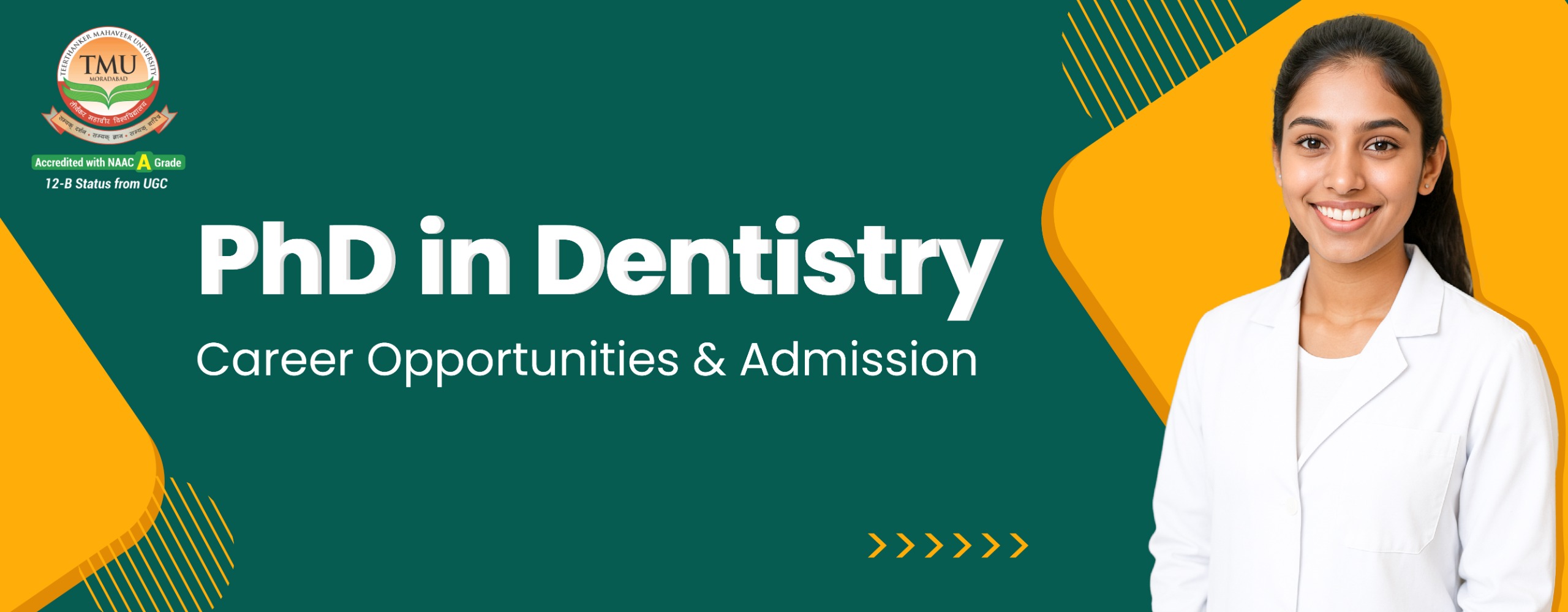PhD in Dentistry: Career Opportunities & Admission
Table of Contents
A PhD in Dentistry is a research-focused doctoral degree programme that involves researching to advance the field of dentistry. It offers dental professionals an opportunity to dive deeper into advanced research. It covers subjects like general dentistry, implants, and dental surgery. The programme typically spans 3-5 years.
Dentistry aims to restore and improve the function of the mouth. Dentistry is also known as dental medicine or oral medicine. It involves both medical and surgical processes to address the solution to oral issues such as cavities, gum disease, and other medical complications. A doctorate in Dentistry is not a professional dental degree, e.g. a DDS or DMD. It enables you to conduct advanced studies in the field of dentistry.
Why Pursue a PhD in Dentistry?
A PhD in Dentistry provides many career opportunities in the healthcare field. Graduates may work in academic fields, research, and industry after acquiring a PhD in dentistry. It is a research-based doctoral degree whereby the individual is permitted to do original research and contribute to dental science.
The programme offers individuals an opportunity to contribute to the advancement of medical technologies. A PhD in Dentistry provides you a path toward becoming a professor, researcher, or thought leader in dental education. You can start your professional journey at dental clinics, hospitals, health centres, or dental colleges. Additionally, you can also work in the Pharmaceutical Industries.
Teerthanker Mahaveer University
Apply for Admission
Click Here To Apply for Admission
Career Opportunities after a PhD in Dentistry
- Academic Researcher or Professor: After completing a PhD in Dentistry, you can work as an academic researcher or professor in colleges or universities. As a professor, you can teach and guide undergraduate and postgraduate students. As an academic researcher, you can conduct innovative research and develop new technologies.
- Investigators: You can work as a principal investigator in research projects. You will be responsible for designing, conducting, and analysing research related to oral diseases and treatments. As an investigator, you can work in government organisations, colleges or research projects.
- Clinical Specialist: After completing a PhD in Dentistry, you can pursue a career as a clinical specialist. A clinical specialist entails jobs that interface high-level clinical skills with research abilities. You can work in a multi-speciality dental hospital, or private dental centre, or a government clinic.
- Consultant: A Dentistry Consultant is a well-trained professional who offers expert advice, further case assessment, and clinical strategic directions. Once a doctor finishes a PhD in dentistry, they can become a consultant, as they have a comprehensive understanding of the subject, research skills, and clinical knowledge.
- Author: A PhD in Dentistry is not only a degree that prepares you clinically or academically, but it also prepares you to be an Author, adding valuable knowledge to the sphere by writing. A lot of oral health researchers and scholars prefer to disseminate their knowledge in books, academic journals, manuals, and electronic materials.
Job Roles and Salary Scope
| Career Path | Role / Job Title | Average Annual Salary |
| Academia / Teaching | Assistant Professor in Dental College | ₹ 6 – 7 L |
| Associate Professor in Dental College | ₹ 7–7.5 L. | |
| Full Professor in Dental College | ₹ 5.8–14.3 L (depending on experience). | |
| Research / R&D | Research Scientist / Dental Researcher | ₹ 8 – 15 L (typical for PhD in dentistry) |
| Industry | Dental Materials Developer / Biotech Researcher | ₹ 8–15 L+ (in R&D or dental products). |
| Clinical Consultancy | Specialist / Consultant Dentist (with research) | ₹ 10 – 20 L+ (depending on specialisation and experience) |
| Public Health / Policy | Oral Health Policy Advisor or Public Health Dentist | ₹ 6 – 12 L+ (varies) — many PhD holders may work in government, NGOs or research bodies |
Eligibility Required for PhD in Dentistry
Educational Qualifications
- You must complete the master’s degree programme in Dental Surgery.
- You must achieve at least 55% in your marks.
- A strong academic record in a Bachelor of Dental Surgery (BDS) with a score of 75% or higher may be accepted
Entrance Exam
- You must qualify for the entrance examination.
- Some universities conduct their own entrance exam, or some may accept scores from national-level examinations.
Other Requirements
- A core component of PhD admission is the assessment of your research aptitude and knowledge of research methodologies.
- After passing the entrance exam, you may be required to attend an interview as part of the final selection process.
TMU: Excellence in Dental PhD Programs
At TMU, research meets inspiration! Teerthankar Mahaveer University stands out as an ideal destination for pursuing a PhD in Dentistry. The PhD programme at TMU has been designed to impart knowledge in the form of courses, seminars, projects and thesis work. It will assist the scholars in organising their ideas and intellectual abilities. The university motivates students to interact within and across the subject areas.
Specialised Clinics
TMU’s Dental College & Research Centre has nine fully equipped speciality clinics. These clinics include Conservative Dentistry & Endodontics, Oral & Maxillofacial Surgery, Orthodontics & Dentofacial Orthopaedics, Prosthodontics and Crown & Bridge, Paedodontics & Preventive Dentistry, Periodontology, Public Health Dentistry, Oral Medicine & Radiology and Oral Pathology & Microbiology. It offers extensive practical exposure to students.
Community Outreach
TMU strongly believes in learning beyond classrooms. Hence, the university provides students with opportunities to engage with various communities through frequent health campaigns, visits to rural areas, and awareness activities, whereby they put their understanding into practice. Such programmes assist the students to know the needs of patients and encourage preventive dental health care.
Research Focus
TMU promotes interdisciplinary learning, thus providing students with the opportunity to study many fields of research. The doctoral research at the TMU Dental College and Research Centre is based on advanced and innovation-related dentistry research in all branches, and there is a possibility of both in vitro and in vivo research. The centre promotes multidisciplinary research and projects in certain departments.
Advance Facilities
TMU has advanced infrastructure, such as state-of-the-art laboratories, modern classrooms, and a wide range of clinical exposures provided by the super-speciality hospital associated with the university. Here, students gain experience with tools like Surgical bone saws, RVG with an intraoral radiography machine, Dental operating microscopes and many more.
Areas of Research
- Oral and Maxillofacial Surgery
- Orthodontics and Dentofacial Orthopaedics
- Prosthodontics and Crown and Bridge
- Paedodontics and Preventive Dentistry
- Periodontology
- Public Health Dentistry
- Oral Medicine and Radiology
- Oral Pathology and Microbiology
- Interdisciplinary research
Application Process for PhD Admission
Admission Guidelines
- Eligible candidates will be required to appear in the written test – the TMU Research Aptitude Test (TRAT).
- An interview for admission will be conducted by the university for PhD admission.
How to Apply
- You can apply online for the PhD admission through TMU’s official admission page.
- Please complete the application form and provide the necessary information.
- Upload required documents
- After successfully applying, the TMU Admission Cell will coordinate with you for the entrance exam.
Required Documents
- Self-attested copies of all educational certificates.
- Supporting certificate for any relaxation in the eligibility criteria.
- Experience certificates, if applicable.
- A 'No Objection Certificate' from your current employer, if employed
- A copy of your latest CV
- A brief research proposal
Conclusion
A PhD in Dentistry is a significant step towards defining the future of oral healthcare. TMU offers a great opportunity to conduct meaningful and innovative dental research, which is achieved through its robust research ecosystem, quality faculty members, well-equipped dental centres, and its aspiration to achieve academic excellence. For scholars aiming to make impactful contributions, lead in academia, or drive advancements in oral health science, TMU must be the right place to start this transformational journey.
FAQ
Q1. What is a PhD in dentistry?
Ans. The PhD in Dentistry is a doctoral degree specialising in advanced study and knowledge in the dental sciences area.
Q2. How long does it take to get a PhD in dentistry?
Ans. The duration of this programme is 3-5 years. It combines both theoretical and practical knowledge.
Q3. What can you do with a PhD in dentistry?
Ans. After completing a PhD in Dentistry, you can work as a consultant, researcher, Instructor, Private Practitioner, and Medical Writer.
Q4. Can you do a PhD after a BDS?
Ans. Yes, you can do a PhD after a BDS degree, and it is a viable path for those interested in deep research in dentistry or related fields like public health and anatomy.
This content gives an overview of the programme and is for educational purposes only. For updated admission guidelines and counselling support, please connect with our Counsellor Team.














